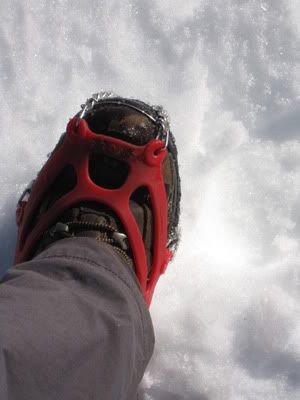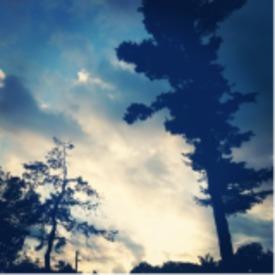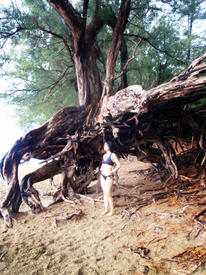Winter hiking

catch1331
Posts: 45
I want to do some winter hiking and camping, have no idea about gear. suggestions
0
Replies
-
What kind of temps are you expecting? Hiking in snow?0
-
Snow hopefully , mid 30s during the day, i have gear for snowboarding, but for over nights have no idea what im looking for0
-
Make sure you have a sleeping bag that has a very low degree rating. In the winter, I have used the same tent but was able to put a small tarp under it, over the snow. A warm dog and/or camping buddy is always recommended. For hiking in snow, I wear the same pants I do snowboarding. A lot of people love gaiters, but I do not personally own any. I use the same hiking boots in winter as summer. I have a pair of Yaktrax, which really help for icy/slick spots, as do a pair of trekking poles. As always, lots of layers are great. I love that you're asking this question. Not many consider hiking in the winter. I love it because it is just as beautiful, but there are not as many people on the trails.0
-
Thanks for the info Joni, I cant wait , do you find using the poles w snowshoes is easier? I dont use them hiking.0
-
I've become less inclined to camping in snow the last couple of years- though I still love day hiking in it. = )
But I would say, a good inflatable sleeping pad combined with a low temp bag makes a huge difference...the pad really breaks up the cold seeping up from the ground. I don't normally use hiking poles, but find they can be very helpful when trekking thru snow. High quality socks that are warm and wick well are also a must for me (personally like rei expedition socks). Hmm...great idea, Joni, about the snow boarding pants.0 -
Thanks for the info Joni, I cant wait , do you find using the poles w snowshoes is easier? I dont use them hiking.
I have trekking poles, and I don't use them often. However, I do still carry them with me. They are light, and the extra weight doesn't bother me. I will use them for going down steep terrain, in slippery conditions, or the occasional stream crossing. For snowshoeing, they can definitely be useful too. Also, they can be handy in survival-type situations for assembling a make-do shelter, heaven forbid.0 -
Make sure you have a sleeping bag that has a very low degree rating. In the winter, I have used the same tent but was able to put a small tarp under it, over the snow. A warm dog and/or camping buddy is always recommended. For hiking in snow, I wear the same pants I do snowboarding. A lot of people love gaiters, but I do not personally own any. I use the same hiking boots in winter as summer. I have a pair of Yaktrax, which really help for icy/slick spots, as do a pair of trekking poles. As always, lots of layers are great. I love that you're asking this question. Not many consider hiking in the winter. I love it because it is just as beautiful, but there are not as many people on the trails.
How do you think Yaktrax compare to Stablicers? I've heard they are cheaper but aren't as durible. What are you thoughts?0 -
Honestly, I've never tried them. I was lucky and got my YakTrax as a hand-me-down, from my father who is a pretty hardcore outdoorsman. One thing is for sure, anything is better than nothing. Two weekends ago, I didn't have anything, and I was holding onto bushes trying not to slide down the hill. Terrifying.0
-
You are in NH, I know on Tuckerman's Ravine they have small sleeping cabins halfway up. Maybe you can find something like that?0
-
Layers! something to block wet, something that keeps you warm if you get wet (fleece/wool, not cotton). I love gaiters, poles and if the snow is right, snowshoes. I find I get way too hot when I'm hiking, and then it only takes a little time to get chilled when I stop. So anticipate convenience of putting layers on and taking them off to adjust. A nice pair of Gortex boots is WORTH IT ($$$ you get what you pay for). Goggles (ski) help if you get caught in wind or snow storm and help with sun. The snow reflects a lot of sunlight so bring sunglasses and wear sunscreen. Bring high calorie food and LOTS of water (2L for day hike). I also carry water purification tabs in case I get stuck. A good multi knife, waterproof matches, flashlight/headlamp, and emergency gear. Also bring things for enjoyment like binos and a camera. If you are in the mountains be sure to check weather and avalanche conditions, travel with at least one other person and tell someone where you will be and when you will be back. Some of this you probably already know! I'm just nerdy about hiking. Have a blast. In my opinion it is one of the best ways to burn calories!0
-
Yes! Layers is key. Make sure you have good underwear that will both keep you warm and transport moisture. I usually don't take mine off ever when hiking during the winter, since they are excellent as pyjamas as well.
Also, for sleeping, you need a good sleeping bag AND a good sleeping mat. If one of them is not good enough, the other one won't be able to do it's job. Sheets for sleeping bags and sleeping bag covers might also be a good idea when in doubt. The latter also protects agains fire, wich you can use to stay warmer during the night (only with constant supervision!)
I have som tips that I use to save on space in my backpack, if I get cold when I go to sleep. For example, you can take your jacket and button in up around you on the outside of the sleepingbag like an extra blanket. I get cold feet so I like to empty my bag en then put my feet (when in sleeping bag) into it. Mine holds about 60 l and reaches about mid thigh. It's not supercomfy, but will help with creating another layer to stay warm.
Also, snow isolates good, and it's not actually as cold to sleep on snow as you think. A lot of the time it's better than without snow. It comfy too!
Good luck on your adventure. I hope this helps!0 -
i def. recommend trekking poles (for all seasons!) ... my knees are shot, so they really save me and are worth their weight in gold, IMO! I'm assuming you'll need snowshoes (NH?) and I saw some ppl mention YakTrax... i have some and i like them, but not so much for hiking. For hikes i prefer Kahtoola's MICROspikes
 Again, worth their weight in gold, especially on the not-quite-winter, yet icy, trails!!!
Again, worth their weight in gold, especially on the not-quite-winter, yet icy, trails!!!
I'm not sure where you plan to camp, but perhaps there are shelters like the lean-tos found thru the Adirondacks... You can set your tent up *inside* the leanto to keep you up off the snow. You'll want a quality sleeping bag and a quality hiking buddy to keep you warm
Wear lots of layers, bring extra Hot Hands packs, and stay dry. (oh, and take pics!)0 -
Something I haven't seen mentioned is a sleeping bag liner. I love using my liner, as it makes my bag just a few degrees warmer, which can make a difference on a cold night. And it's washable, so my sleeping bag doesn't get as smelly!
Also, if you keep a water bottle in your tent overnight (hydration is incredibly important in cold weather...), turn it upside down for storage. That way if/when ice starts to form, it won't keep the lid from opening.
Have fun. Post some pictures!0 -
These are all great tips. I like to launder things too much, so a liner would lengthen the life of my sleeping bag!
I also had never thought of further warming my feet in my pack.
@ToAllWhoWander...thanks for your answer about insulated pants on the other thread. great name, by the way!
I don't know if this is a weird question, but is it realistic to expect one's winter traction device to be usable for running as well?
For instance, does anyone have enough experience w/ the microspikes, yaktrax and stabilicers to have tried them for both their hiking boots and running shoes? I was assuming it would not work since my running shoes are so much less bulky than my boots, but then again these are adjustable traction devices...
Any thoughts on this would be appreciated...:flowerforyou:0 -
I don't know if this is a weird question, but is it realistic to expect one's winter traction device to be usable for running as well?
For instance, does anyone have enough experience w/ the microspikes, yaktrax and stabilicers to have tried them for both their hiking boots and running shoes? I was assuming it would not work since my running shoes are so much less bulky than my boots, but then again these are adjustable traction devices...
Any thoughts on this would be appreciated...:flowerforyou:
I have both YakTrax and Microspikes. The Microspikes are MUCH more aggresive and i can't see running in them (due to the points, not the rubber that attaches to your shoes) unless you were running on a good layer of ice. I've run many miles in my YakTrax and they're wonderful for running, IMO but not so much for hiking. Much more prone to breaking with the rougher terrain and the grip is not aggressive enough for really sure footing on steep hills, IMO.
YakTrax are cheap though so if you are looking to try something out for running, shovelling, etc, they are the ones to get.
(my microspikes) 0
0 -
I have both YakTrax and Microspikes. The Microspikes are MUCH more aggresive and i can't see running in them (due to the points, not the rubber that attaches to your shoes) unless you were running on a good layer of ice. I've run many miles in my YakTrax and they're wonderful for running, IMO but not so much for hiking.
(my microspikes)
Very helpful - going to REI w/ my shoes to check it out! Excited! 0
0
This discussion has been closed.







